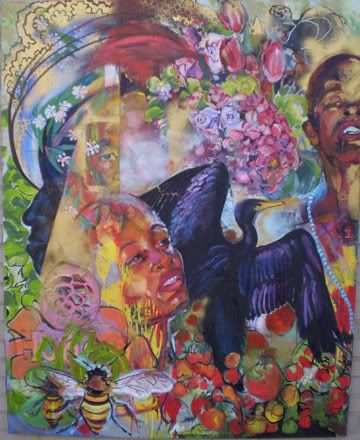Although I had hoped it would grow in straight... my fade is still crooked. It slants down to the left. I must say this is not the most attractive period of my life, but that's okay. You gotta go in to come out right. That's why folks be mad at pretty girls tho'. For some of us, we gotta work hard to cultivate our beauty. If we aren't right inside, we stay busted outside. So... we be mad when "Hella Pretty on the outside, don't have to work on the inside" gets treated like royalty just cuz she looks good. Remember if it wasn't for "the field" there would never have been a "house".
Today is Sunday. I can feel myself slowing down and spreading out. My gaze, my saunter, my thoughts expanding into the wide-open space or "Badza" as the Ewe call it. "Agbadza" being the movement that one does when they are in a wide-open space. There are many kinds of "Agbadza", but the main step is a rhythmic breaking in the chest. "Flapping your wings" is the best way I can describe it. Women dance it with their elbows close to their body to show their femininity. Men dance it with their elbows out and up to show their masculinity. Both opening the space within themselves. Both connecting the smaller drum that activates their heart shakras to the larger drum that is tradition. Each a small window into their community. Each a reflection of spirit. I am learning exactly how diverse, intricate, and profound African culture really is.
 Artwork by Alexandra Coveleski. (2006)
Artwork by Alexandra Coveleski. (2006)I haven't had an opportunity to see "Agbadza" in its cultural context yet. My familiarity is really with the Haitian "Akbadja". I only know a couple of steps (eventhough I think there are only a few). Ewe "Agbdaza" looks almost identical to the Haitian dance "Mayi-Zepaules". They both have the same bell pattern and you dance them with the same verasity. The particular kind of "Agbadza" I am learning is called "Gadzo". The connections between Ewe folklore and Haitian folklore are really quite fascinating. My teacher Robert Fugah has not shown me one step that I don't already recognize from Haitian dance. Ofcourse they do these steps at different times, in different dances, for different reasons, but I see us (the Africans in the West) all up and through it. The Ewe rhythms are one of the sonic roots from which Afro-Cuban, Brazilian, Haitian, and Puerto Rican traditional music have sprung.
In Ewe language, the word Mayi means "...I will go." Mayi-Zepaules and Gadzo are both fighting dances (Mayi can also be done as an agricultural dance). Both honor connection to the land. Gadzo, a war dance drama traditionally performed by men after returning from the bush to tell the people in the village their tales of battle. Mayi, pounding down into the earth and drawing from its power to bring spirits from far away. In my imagination, "Mayi" has become the voice of a black woman and "Gadzo", that of a black man. I have been watching how they are speaking to one another so that I can figure out how to paint the moving picture of their dynamic and which spell to cast. For the past year or so I have been thinking about the effect that fathers leaving their children has had on the black community. How it has affected the mothers, the sons, the daughters and the fathers themselves. What this means for future generations? Etc. I don't want to dwell on the ills, but really, I think it's about sparking the juju to set things in a different motion. I think that's what I'm trying to figure out. Interesting that I'm staying with a Ga family. (The Ga are patrilineal).

No comments:
Post a Comment